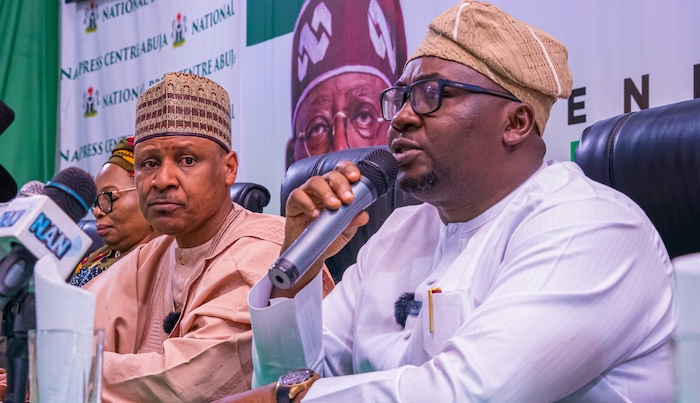Business
Nigeria Demands Foreign Power Loans to Boost Local Economy

The Nigerian government has asserted that foreign loans acquired for the development of the power sector must prioritize local production and job creation. Speaking at the Nigeria Renewable Energy Innovation Forum (NREIF) in Abuja, Adedayo Olowoniyi, Chief Technical Assistant to the Minister of Power, Adebayo Adelabu, emphasized the need for these loans to enhance Nigeria’s competitive edge and stimulate industrial growth.
During the event, organized by the Rural Electrification Agency, Olowoniyi cautioned against excessive reliance on imported goods that do not contribute value to the local economy. He stressed the importance of fostering the domestic production of solar energy products, positioning it as critical for Nigeria’s energy future.
“We must consume what we produce in Nigeria,” stated Olowoniyi. “For too long, we have relied on importation, which has negatively impacted our currency.” He highlighted the risks of depending on foreign sources for energy access, arguing that such a reliance could hinder the country’s industrialization and job creation efforts.
Olowoniyi articulated a vision where government funding drives local job creation and economic development. “One thing we must not do is to use foreign loans to further develop other countries. It’s illogical,” he explained. He called for energy production to be closely linked to industrialization, asserting that this linkage would foster growth in the sector.
The call for local production aligns with a broader strategy to enhance Nigeria’s industrial capabilities. Olowoniyi cited successful examples from countries like India and China, which have effectively utilized their local industries to provide energy access. He acknowledged that while not everything needs to be produced domestically, the energy sector should focus on creating a sustainable economic framework.
In a related discussion, Rumundaka Wonodi, the pioneer Chief Executive of the Nigerian Bulk Electricity Trading company, noted the stark contrast in investment levels between Africa and the global renewable energy sector. Despite significant investment globally, Africa received only $40 billion in 2024, representing a mere 2 percent of total investments. Wonodi urged participants to explore ways for Nigeria to unlock its renewable energy investment potential.
Concerns regarding funding equity for local investors were raised by Dr. Lazarus Angbazo, Chief Executive of InfraCorp. He pointed out that the inability to access funding in local currency could jeopardize sustainable growth, as reliance on foreign currency is not viable in the long term. “InfraCorp aims to create market support for sustainable investments across various infrastructure sectors, not just energy,” he noted.
The importance of integrating renewable energy education into academic institutions was highlighted by Tajuddeen Abbas, Speaker of the House of Representatives, represented by Rep Shina Oyedeji. He urged that renewable energy courses be included in universities, polytechnics, and other tertiary institutions to build a skilled workforce capable of supporting the sector’s growth.
The discussions at the NREIF reflect a growing recognition of the need for Nigeria to harness its resources effectively. By focusing on local production and job creation, the government aims to transform the power sector into a catalyst for broader economic development, positioning Nigeria more favorably in the global energy landscape.
-

 Health3 months ago
Health3 months agoNeurologist Warns Excessive Use of Supplements Can Harm Brain
-

 Health3 months ago
Health3 months agoFiona Phillips’ Husband Shares Heartfelt Update on Her Alzheimer’s Journey
-

 Science2 months ago
Science2 months agoBrian Cox Addresses Claims of Alien Probe in 3I/ATLAS Discovery
-

 Science2 months ago
Science2 months agoNASA Investigates Unusual Comet 3I/ATLAS; New Findings Emerge
-

 Science1 month ago
Science1 month agoScientists Examine 3I/ATLAS: Alien Artifact or Cosmic Oddity?
-

 Entertainment5 months ago
Entertainment5 months agoKerry Katona Discusses Future Baby Plans and Brian McFadden’s Wedding
-

 Science1 month ago
Science1 month agoNASA Investigates Speedy Object 3I/ATLAS, Sparking Speculation
-

 Entertainment4 months ago
Entertainment4 months agoEmmerdale Faces Tension as Dylan and April’s Lives Hang in the Balance
-

 World3 months ago
World3 months agoCole Palmer’s Cryptic Message to Kobbie Mainoo Following Loan Talks
-

 Science1 month ago
Science1 month agoNASA Scientists Explore Origins of 3I/ATLAS, a Fast-Moving Visitor
-

 Entertainment2 months ago
Entertainment2 months agoLewis Cope Addresses Accusations of Dance Training Advantage
-

 Entertainment3 months ago
Entertainment3 months agoMajor Cast Changes at Coronation Street: Exits and Returns in 2025









